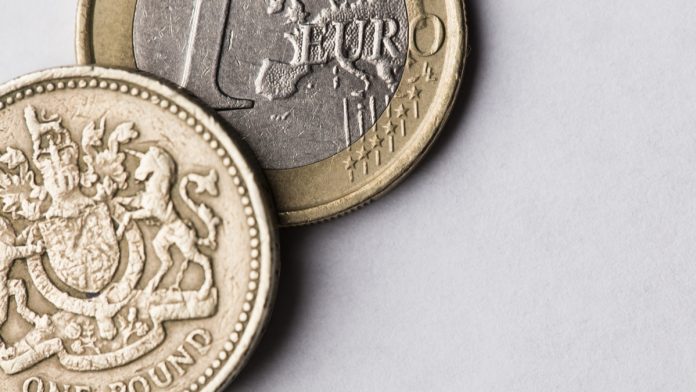The pound euro exchange rate rebounded in the previous session after falling to a 23-month low on Monday. The pair rallied to a high of €1.0922 on Tuesday. However, gains were short lived, and the pair was trading lower once again in early trade on Wednesday.
| What do these figures mean? |
| When measuring the value of a pair of currencies, one set equals 1 unit and the other shows the current equivalent. As the market moves, the amount will vary from minute to minute. If the euro amount increases in this pairing, it’s positive for the pound.
Or, if you were looking at it the other way around: 1 EUR = 0.87271 GBP In this example, €1 is equivalent to approximately £0.87. This measures the euro’s worth versus the British pound. If the sterling number gets larger, it’s good news for the euro. |
The pound was in favor in the previous session despite no deal Brexit fears. Both the EU and the UK are digging their heels in over the Withdrawal Agreement. The EU is now considering a no deal Brexit the most likely outcome on 31st October.
Meanwhile opposition to a no deal Brexit continues to gather momentum among politicians. Leader of the opposition Jeremy Corbyn is planning a no confidence vote against Boris Johnson for early September. Pro-remain MPs are considering forming a cross party coalition with the sole purpose of extending Article 50 again and delaying the UK’s exit from the EU. Usually more political uncertainty would weigh on the pound. However, given that it could mean that a disorderly Brexit is avoided, the pound is moving higher.
| Why is a “soft” Brexit better for sterling than a “hard” Brexit? |
| A soft Brexit implies anything less than UK’s complete withdrawal from the EU. For example, it could mean the UK retains some form of membership to the European Union single market in exchange for some free movement of people, i.e. immigration. This is considered more positive than a “hard” Brexit, which is a full severance from the EU. The reason “soft” is considered more pound-friendly is because the economic impact would be lower. If there is less negative impact on the economy, foreign investors will continue to invest in the UK. As investment requires local currency, this increased demand for the pound then boosts its value. |
Today the only economic data on the UK calendar is Halifax house price figures. Higher house prices indicate a more confident consumer and economy. Meanwhile falling house prices point towards a more troubled picture.
Euro Gains Despite Mixed German Data
The euro failed to react to stronger than forecast German factory data in the previous session. Data showed that German factory orders rebounded in June, increasing 2.5% month on month, well above the 0.5% increase forecast and -2.5% decline in May. Stronger factory orders could indicate stronger economic growth in Germany. This was some rare relief for the eurozone’s largest economy after a recent stream of poor data.
German factory orders received a boost from foreign orders, up 5% while domestic orders fell 1%. Orders from countries outside the eurozone increased 8.6% whilst orders from the bloc declined 0.6%. This suggests that the biggest problem for German industry may not be the weakening global economy but a weakening eurozone economy.
Today the focus will remain on Germany with German industrial production showing a larger than forecast decline. The euro has barley reacted as German industrial production declined by -1.5% month on month in June, well ahead of -0.5% decline forecast. Weak data usually hits demand for a currency.
| Why does poor economic data drag on a country’s currency? |
| Slowing economic indicators point to a slowing economy. Weak economies have weaker currencies because institutions look to reduce investments in countries where growth prospects are low and then transfer money to countries with higher growth prospects. These institutions sell out of their investment and the local currency, thus increasing supply of the currency and pushing down the money’s worth. So, when a country or region has poor economic news, the value of the currency tends to fall. |
This publication is provided for general information purposes only and is not intended to cover every aspect of the topics with which it deals. It is not intended to amount to advice on which you should rely. You must obtain professional or specialist advice before taking, or refraining from, any action on the basis of the content in this publication. The information in this publication does not constitute legal, tax or other professional advice from TransferWise Limited or its affiliates. Prior results do not guarantee a similar outcome. We make no representations, warranties or guarantees, whether express or implied, that the content in the publication is accurate, complete or up to date.
The content at CurrencyLive.com is the sole opinion of the authors and in no way reflect views of TransferWise Ltd.





